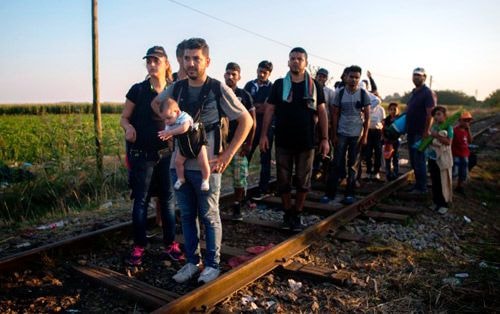Mission impossible for Arab countries?
(Baonghean) - Recently, while Europe is struggling to find solutions for the influx of immigrants from Syria or Iraq, the rich Gulf countries in the Middle East seem to be indifferent and have not made many moves to help. Under pressure and criticism from the international community, the Foreign Ministers of the Arab League and the Organization of Islamic Cooperation have just held urgent meetings to come up with solutions to help the influx of refugees. But are the Gulf countries really willing to help, and will the solutions proposed contribute to solving the problem at its root?
With the two recent emergency meetings, these are perhaps the clearest moves by Arab countries, including the Gulf countries, to show their concern and goodwill towards the migrant crisis since it broke out. Recently, public opinion in countries with refugees such as Syria, Iraq, Libya and even Western countries have wondered why the Gulf countries, which have much more similarities in cultural and religious values than Europe, have made almost no specific moves to welcome migrants. CNN recently published surprising statistics showing that, as of the end of August 2015, more than 4 million Syrians had fled their homeland to seek asylum; however, the number of refugees that the 6 countries of the Gulf Cooperation Council (GCC) including Saudi Arabia, Kuwait, Bahrain, Qatar, Oman and the United Arab Emirates (UAE) are very modest. Of the six Gulf countries, only the United Arab Emirates has accepted 250,000 refugees, while the others have stopped at zero. The criticism is even more severe when the Arab countries in the region that are currently accepting refugees do not have a high standard of living like the Gulf countries. According to the International Monetary Fund (IMF), Jordan's per capita income is only 11,000 USD/year, or Türkiye, which is home to the largest number of refugees, is also slightly higher with an per capita income of 20,000 USD/year. Meanwhile, in Qatar, the average income is 143,000 USD/person/year, Kuwait is 71,000 USD, and Saudi Arabia is 52,000 USD.
 |
| Syrian refugees walk along the railway near the Serbian village of Horgos to cross the border into Hungary. Source: CNN |
Many reasons have been given to explain this "indifference" of the Gulf countries. Firstly, all 6 Gulf countries did not sign the 1951 Refugee Convention, which was adopted after World War II, when hundreds of thousands of refugees had to leave their homes across Europe. This Convention was later amended in 1967, which added refugees from all over the world, not just Europe. Therefore, in principle, the Gulf countries have no responsibility or obligation to help refugees. Secondly, it is clear that accepting refugees would mean putting the security of the Gulf countries at risk, as terrorists such as the Islamic State (IS) could easily infiltrate. The Gulf countries, which are said to oppose Syrian President Bashar al-Assad and support the opposition in this country, are also afraid that Assad's supporters could enter their territory and take revenge. And third, according to these countries, the refugee crisis is a consequence of the Middle East policies of the United States and Europe. Therefore, it is inevitable that these countries need to accept more refugees, not them - the Gulf countries. Recently, the relationship between the Gulf countries and their American allies has also encountered many problems, so these countries will not be willing to bear the consequences caused by their allies.
However, it is not entirely correct to say that the Gulf countries are staying out of the migration crisis. Although they do not accept migrants, these countries have provided strong financial support to help refugees in countries such as Lebanon, Jordan and Türkiye. For example, the United Arab Emirates has provided 530 million USD in humanitarian aid to Syria over the past 4 years; or Saudi Arabia has also provided about 700 million USD in aid and set up clinics in various refugee camps. However, public opinion seems to be still not satisfied and raises the question, can the Gulf countries open their doors to receive migrants in the face of the increasingly serious migration storm? This is what other Arab countries in the region such as Lebanon, Jordan, Egypt and Türkiye have been doing.
However, in the two latest emergency meetings, the solution proposed was still very general, that Arab countries will try their best. This is understandable, because for Arab countries currently receiving refugees, Arab League Secretary General Nabil al Arabi said, Jordan and Lebanon are shouldering more than 3 million refugees - a number that exceeds the financial resources of these two countries. Meanwhile, for Gulf countries, although refugees are mainly Sunni Muslims like the majority of the population in these countries, the dangers of disrupting the security environment will be a door that they do not want to open. In case of being forced to accept, smaller Gulf countries such as Qatar or the United Arab Emirates (UAE) will find it difficult to accept more refugees. Because these two countries currently have millions of foreign workers - exceeding the local population. Therefore, opening the door to receive refugees will be difficult. Therefore, in the coming time, it is certain that financial support for refugees will still be the choice of the Gulf countries. However, this measure will only solve the tip of the problem.
Phuong Hoa
| RELATED NEWS |
|---|






